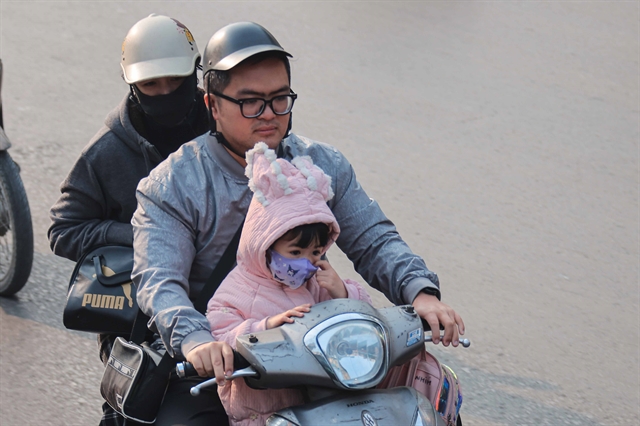

A short story by Nguyễn Hữu Tài
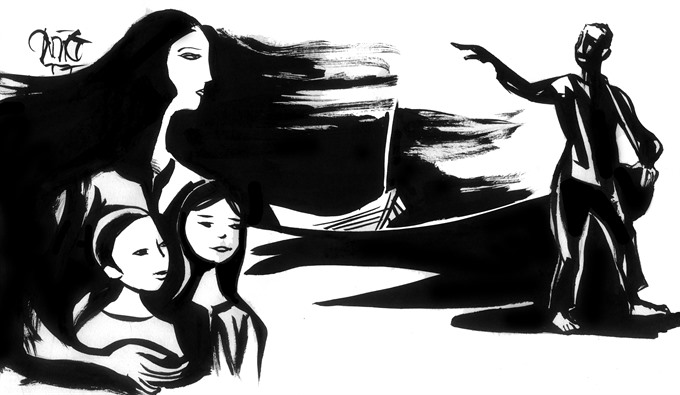 |
| Illustration by Đỗ Dũng |
by Nguyễn Hữu Tài
Getting up, Miên looked out of the window. The dim sunbeams piercing the thick clouds did nothing to warm the November morning.
“Bitterly cold! Winter hasn’t come yet. If the snow keeps coming down like this I won’t be able to stand it,” she said to herself.
“Mum, the year before last in one month there were ten snowstorms, one after another. Worse still, one of them lasted more than two days,” said her daughter Dung.
“Really?”
Miên put on a thick jacket then in her slippers she walked to the door. She opened it. To her surprise, in their bedroom her two grandchildren were still sleeping soundly. They smiled and smiled. “Wow, they’re enjoying their dreams,” she whispered. “Soon they’ll be bugging me non-stop,” she added.
Going downstairs, she made a cup of coffee, as she used to drink in her hometown. She also wanted to have some fruit juice outside in a café, but she dared not, for all its customers were all males. “Why should I be the odd man out?” she said to herself.
In the kitchen she found a big turkey defrosting on the table.
“Yesterday afternoon I told you to get some chickens for Thanksgiving but you’ve bought this huge, disgusting turkey!” Miên reproached her daughter.
“Mum, this is American culture,” Dung replied. “On Thanksgiving, the main course is turkey, of course, along with potatoes and mac and cheese, with pumpkin pie to finish. When in Rome, do as the Romans do. We’re holding a great feast for our guests this evening as well,” Dung explained to her mother.
Miên had been in the USA for a family reunion for more than a month, much longer than she expected to stay. All she did here was babysit her grandchildren. Her heart ached for her native village, the meandering rural paths, the thatched cottages, the earthen graves of her forefathers and, above all, her friendly neighbours.
She had come because of a letter Dung had sent her. It said, “Now that your two daughters are leading a happy life here in Massachusetts with our kids, you’re still alone in Vietnam. How can we feel at ease, Mum?”
Surprisingly, a few days before Thanksgiving Dung asked her, “Mum, do you want to meet Dad together with our stepmother? Let me know soon so we can avoid any awkwardness.”
“Well, let things take their due course, my dear,” she replied after a long silence. “Is it necessary for both of us to handle our problems right now? What’s more, I doubt he’ll be man enough to look me in the face. I’ve been here a whole month and haven’t seen him. If he really wants to see me, why hasn’t he come here?” she went on.
* * *
How could Miên forget that night when her husband embraced their two daughters and hugged her tightly? She just cried and cried. “Stay behind to look after the kids, my darling,” he told her in a faltering voice. “I’ll try to get American citizenship within five years. Then I’ll come back here to forge a new marriage certificate so you and our children can settle down there for good.”
They all said farewell to him before he left.
Before that Miên, together with her three younger sisters – Liễu, Thương and Thy, faked their husbands’ birth certificates so that they became younger and unmarried and could leave more easily. Going to America, one by one they left the four married women behind as single young females, with their seemingly fatherless children in the poverty stricken countryside.
Two, four, then seven years passed by after the wives’ long wait in vain.
While they toiled tirelessly in the country, the men broke their promises. The four women were deeply upset. Eventually, three of them remarried, each for their own reasons. “Why should we wait for these disloyal men in vain when we know they abandoned us for ever?” they said. Despite her pain, Miên stayed single. She kept the $100 banknotes sent to her in a safe due to her self-respect rather than for wealth. She eventually changed the cash into taels of gold for her two daughters’ dowry when they got married later. The main reason for Miên’s celibacy was that she did not want her daughters to suffer the same fate as her, she was too busy making sure they wouldn’t have to rely on her new husband if she remarried.
Several men in her village, divorced or single, came to her but she refused their proposals for marriage, saying “My dear, not until my daughters grow up could I think of marrying again.”
Unexpectedly, when they become adults they were eligible for US green cards to stay with their dad. Consequently, she was left alone in her hometown. “Mum, if you find a good man, marry him as soon as possible. As for us, who are now living very far from you, we can’t help you much anymore,” said one of them in a letter to her.
The year before last, one of her old friends who had studied in the USSR settled down there and became very rich, but his home life was less rosy. His wife left him with the three children in her custody. He decided to return to Việt Nam to enjoy his old age in peace. He met Miên by chance. He soon asked her for her hand in marriage, and she accepted. Poor them, suddenly in Ukraine there was great political unrest, destroying his business. All his property and money was gone. Immediately, he flew back to Ukraine to support his ex-wife and kids, who were now destitute.
Miên was alone again.
* * *
Keeping the curtain ajar, Miên looked out of the window. In the front courtyard of the building, she saw many cars.
“Oh dear, lots of guests have already come in! Perhaps, they are all in the basement ready for the Thanksgiving party,” she whispered to herself. Although she had got dressed, she stayed upstairs, too nervous to go down.
“After more than 20 years of separation, what will seeing him be like? Are the sweet memories of the past still fresh in his mind? And am I bold enough to stare squarely at his eyes? What will happen when I meet his new wife?” Doubts began to flood her mind.
“Mum, go downstairs to chat with Dad. He’s been waiting for you,” Dung urged her mother.
Slowly, she walked downstairs, Her heart was thumping. Her trembling hands seemed unable to keep her balance. Her teeth gnashed against each other. “Why am I so worried! Don’t weep, Miên,” she whispered to herself. “After so many years waiting for this, try to relax,” she comforted herself.
Downstairs, a man with his back to the stairs could be seen. Putting her right hand over her breast, she cleared her throat.
Stirred by the noise, he turned round.
“Evening, my dear! How are you feeling?” he greeted her.
“Not too bad. You?”
“So so,” he replied nervously.
Her lips tightened. She tried not to cry. She wanted to hit him in the face and scold him. She also wanted to tell him about the hardships she had suffered at home while he was abroad: extreme poverty, loss of husband and merciless remarks. What’s more, she wanted to tell him that she did not need his money.
As for him, he wanted to console Miên by wiping away her tears or holding her hand tightly, but he did not dare, simply because he was with another woman.
He also wished to mention the troubles he had met with during his stay abroad such as loss of youth, hard work, solitude, harsh winters and racial discrimination. “It all happened because of my decisions,” he reminded himself.
Fortunately, he met Thu, an overseas Vietnamese, by chance when he drove his car to a garage to have it repaired. Its owner’s 20-year-old daughter attracted the lonely man of thirty remarkably. She soon fell in love with him too. Both clung to each other passionately in a secret love affair. He completely forgot his wife still living alone in Việt Nam.
Thu was two months’ pregnant. For a Catholic woman, abortion was prohibited. Therefore, the couple was urged to get married as soon as possible aso a house worth a million dollars would be given to Thu as dowry.
All he could do was to go along with it.
* * *
Actually, he also wanted to return to his home to pay tribute to his ancestors’ graves and to carry out his old dreams: to go along the Dinh by boat in the late evenings, to catch fish with his large net for his family, to take his two little kids to school, then back home in the afternoons and, last but not least, to lull them to sleep at nights.
He also wanted Miên’s forgiveness. Yet, he was afraid that the local authorities might discover he had forged the documents and he would be unable to return home again. On the other hand, he could hardly take his old flame to the US for a reunion either because of his new wife. As for Thu, she often told him to return home to Việt Nam to visit Miên and his relatives. “If you keep on tormenting yourself like this, the kids and I will be miserable too,” she reminded him again and again.
“At least he looked after the two children. I’ve accepted a lonely life anyway,” Miên said to herself.
* * *
“Forgive me, my dear,” he said to Miên during their encounter.
“What for?”
“Because you still bear a grudge against me, I think.”
“Oh, no no! What’s the use of hating someone for that long? Anyway, we’re old now.”
“Back then...”
“Let bygones be bygones! Let’s think about our children’s future. Come what may, our relationship ended a long time ago,” Miên told him.
He felt as if a heavy burden had been lifted from his bony shoulders.
* * *
“Did she come here with you?” Miên asked him.
“Who do you mean by ‘she’?”
“Your young and pretty wife, of course.”
“Yes, she did. Downstairs.” he replied.
“Then, let me go downstairs to meet her. I wish to thank her for what she has done for our daughters.”
“We had to look after them, needless to say,” he said.
“Of course, I know, I know! Anyhow, take me to her!"
Saying so, Miên stood up abruptly. When her brooch came off, her long sweet-smelling hair flew down over her back.
“How beautiful!” he whispered to himself.
“Well, I’ve cooked a pot of chicken gruel with all kinds of spice for you to enjoy. I think you’ll like it because, frankly speaking, the turkey they have here pales in comparison to a taste of home,” she told him.
Translated by Văn Minh


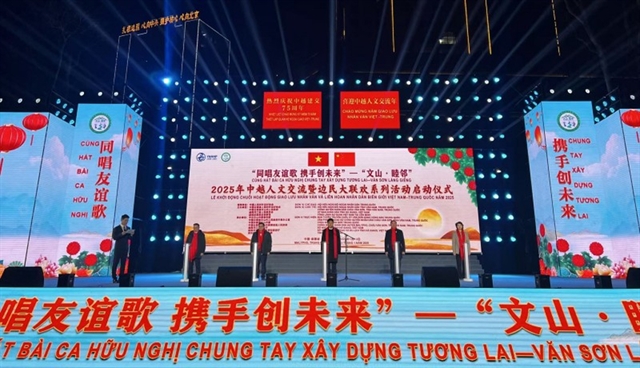
.jpg)
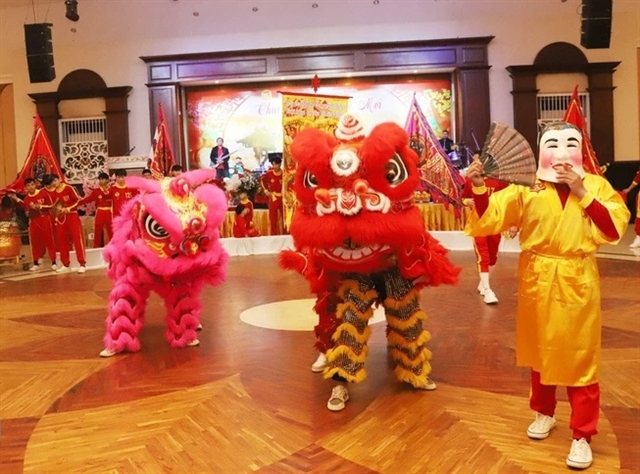
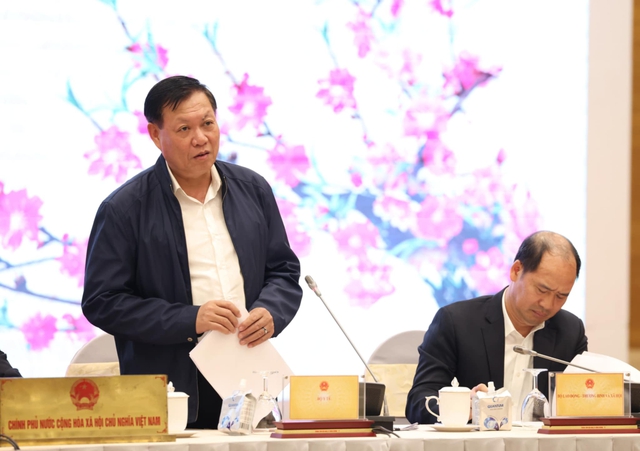
.jpg)
